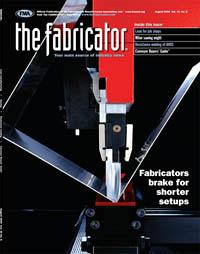Contributing Writer
- FMA
- The Fabricator
- FABTECH
- Canadian Metalworking
Categories
- Additive Manufacturing
- Aluminum Welding
- Arc Welding
- Assembly and Joining
- Automation and Robotics
- Bending and Forming
- Consumables
- Cutting and Weld Prep
- Electric Vehicles
- En Español
- Finishing
- Hydroforming
- Laser Cutting
- Laser Welding
- Machining
- Manufacturing Software
- Materials Handling
- Metals/Materials
- Oxyfuel Cutting
- Plasma Cutting
- Power Tools
- Punching and Other Holemaking
- Roll Forming
- Safety
- Sawing
- Shearing
- Shop Management
- Testing and Measuring
- Tube and Pipe Fabrication
- Tube and Pipe Production
- Waterjet Cutting
Industry Directory
Webcasts
Podcasts
FAB 40
Advertise
Subscribe
Account Login
Search
Wise words from the mountaintop—Part 8
Yeah, money talks, but so do procedures
- By Gerald Davis
- August 10, 2004
- Article
- Shop Management
Editor's Note: This is the eighth episode in a mountaintop dialogue that Gerald has been having with a "wise business guru." They have been talking about communication among operator, machine, and management—the "work unit."
I started to answer his question about how a piece of equipment "communicates." "Knobs and controls are the input devices, and the workpieces it produces are the output devices," I offered. We both watched the animated picture he projected against a white marble boulder.
With his laser pointer, the guru targeted the box in the middle to make it light up and dance. "This box represents the operator. The operator communicates with the machine by pressing buttons, turning knobs, or whatever it takes to set it to work. The machine tries to communicate with the operator via light bulbs, displays, sound signals, and finished work," he narrated.
"What do you mean, tries?" I asked.
"Good question, but hold that thought," he said as he pointed to the third box. "This box represents management. Management tries to talk to the operator."
I interrupted him, "There is that word, tries, again!"
"Yes. If the operator does not know the machine, the machine can try to communicate, but the operator will not get the message," he explained.
"I get it! With policies for training and procedures for operator qualification, we give the machine a chance to talk to the operator," I said. "Very good, little hopper grass!" he praised.
Speaking Volumes by Setting Priorities
"Now what do you suppose would prevent the operator and management from communicating with each other?" he asked.
"No habla ingls?" I joked.
He smiled. "Language sometimes is a barrier, but more often the problem is with expectations. It is obvious to the manager that the pile of work needs to move. It is equally obvious to the operator that the entire pile cannot be moved all at once. What are the priorities? What are the criteria for acceptance? Again, policy and procedure are critical to successful communication!" he proclaimed.
The picture now displayed animated arrows symbolically "communicating" between the manager and operator, and between the operator and the machine. "How does management talk to the machine? How does the machine talk to management?" he asked me. After a few puzzled moments, I just shook my head.
"If the operator has been given documented work procedures, clear expectations are set for what the machine is to do and how it is to do it. Armed with those procedures, the operator can listen to the machine as it reports good—or bad—behavior. Then the operator can take appropriate action," he hinted.
A bulb came on in my mind. "If the work unit—management, operator, and machine—has policies and procedures, then there is a communication path between all three elements based on clearly understood expectations!" I exclaimed.
"You've nearly got it right. Do not forget enforcement. The work unit must produce accurate performance reporting and be held accountable."
Continuous Improvement
"Sure! If all three elements of the work unit are held accountable to each other, there is a constant and built-in pressure to improve," I blurted. "Continuous improvement is a vital behavior in any well-run organization," he agreed. Arrows of communication were now dancing through and between all of the boxes projected on the boulder.
He had given me a new appreciation for policy and procedure. I had always nurtured a phobic reaction to bureaucracy, thinking that formal regimen stifled innovation and creativity. I began to realize that I was the one stifling communication in my business because of this attitude. "Without training and expectations, without standards and guidelines, the operator has no way of understanding what management wants or of interpreting what the machine is saying.
"I think I also see how this gives my strategy and tactics a voice. By expressing my vision and expectation in the form of written policies and procedures, and by enforcing them, I can create a system that gives me constant and meaningful feedback about the behavior of the company," I thought out loud.
I pondered the amount of work that it would take to bring all of our documentation up to speed, but that wouldn't be the hardest part because I have written many elaborate business plans and policy manuals over the years. Enforcement of the plans and manuals was the hardest part and a skill I knew that I had not yet developed. I shared those thoughts with the guru.
"You must choose to lead, follow, or get out of the way. Your nice little company has survived some terrible management practices. I think it is likely that the business will continue, but I'm not sure about the managers, including you! You and the rest of the management staff must either change your behavior and do the job or get someone else to do it.
"Many, if not all, of them need to be retrained. Some may need to be replaced," he warned. "But you have a more urgent problem to deal with," he said.
"What problem is that?" I asked.
"You know, as a student you can be pretty thick-headed," he replied. "Maybe you need to review what we have been talking about all this time?"
I tried to look lost in meaningful thought.
"Check out the stone tablet," he suggested.
I picked it up and noted its message that the highest priority of the business is cash flow. "Wait, wait! Don't tell me! My biggest problem is that the company is suffering from bad cash management," I tried to look bright while I announced this.
"Actually, your cash problem is just a symptom," he replied sadly. "The cause traces back to your strategy and to your planning," he continued mournfully.
"I knew that," I chirped, again trying to seem bright.
Constant Crisis Management
"Yeah, right," he said drolly. "While the boom was fading, you tried to keep sales volume up by taking on any customer who walked in the door. Good fit or bad fit, an order was an order. Unfortunately, your sales plan was chaotic and forced you to cut expenses. You did some half-measure layoffs and let attention to detail slip while you pouted. Your basic mode of operation has become constant crisis management. Leadership has been on hold, and now you are completely buffaloed by your inability to borrow more money! Does that hit pretty close to the mark?" he asked.
I became petulant. "Why, yes, it does. But should we be talking about this in a nationally published magazine? What if my customers or competitors get wind that I might have a few minor problems to work out?" I worried.
"Not to worry, big guy. Most of the people who care already know that. They are all looking forward to you getting things straightened out. And besides, by the time this gets published, you will already be well on the way to recovery," he promised.
Know Your Niche
"You have been hinting and hinting but are yet to explain a thing about strategic thinking," I protested. He turned and began fiddling with a laser-etching machine. In a few minutes he produced a lovely little anodized aluminum button with a message artfully engraved in a circular pattern. With a flick of his thumb he tossed it to me.
"Strategic thinking is a process, not an event," it read. On the flip side was engraved, "Know your niche." The happy face was a nice touch. "Thanks, oh laser-marking-equipped guru. Now I'll have platitudes near at hand in case of an emergency."
He smiled slightly, unperturbed. "Tier?" he inquired.
I misunderstood him and said, "No, I appreciate the gift, but I don't feel like crying."
"Your strategy, you manager wannabe! On what tier does it place your company?"
The saga continues ...
About the Author
Related Companies
subscribe now

The Fabricator is North America's leading magazine for the metal forming and fabricating industry. The magazine delivers the news, technical articles, and case histories that enable fabricators to do their jobs more efficiently. The Fabricator has served the industry since 1970.
start your free subscription- Stay connected from anywhere

Easily access valuable industry resources now with full access to the digital edition of The Fabricator.

Easily access valuable industry resources now with full access to the digital edition of The Welder.

Easily access valuable industry resources now with full access to the digital edition of The Tube and Pipe Journal.
- Podcasting
- Podcast:
- The Fabricator Podcast
- Published:
- 04/16/2024
- Running Time:
- 63:29
In this episode of The Fabricator Podcast, Caleb Chamberlain, co-founder and CEO of OSH Cut, discusses his company’s...
- Trending Articles
AI, machine learning, and the future of metal fabrication

Employee ownership: The best way to ensure engagement

Steel industry reacts to Nucor’s new weekly published HRC price

How to set a press brake backgauge manually

Capturing, recording equipment inspection data for FMEA

- Industry Events
16th Annual Safety Conference
- April 30 - May 1, 2024
- Elgin,
Pipe and Tube Conference
- May 21 - 22, 2024
- Omaha, NE
World-Class Roll Forming Workshop
- June 5 - 6, 2024
- Louisville, KY
Advanced Laser Application Workshop
- June 25 - 27, 2024
- Novi, MI



























